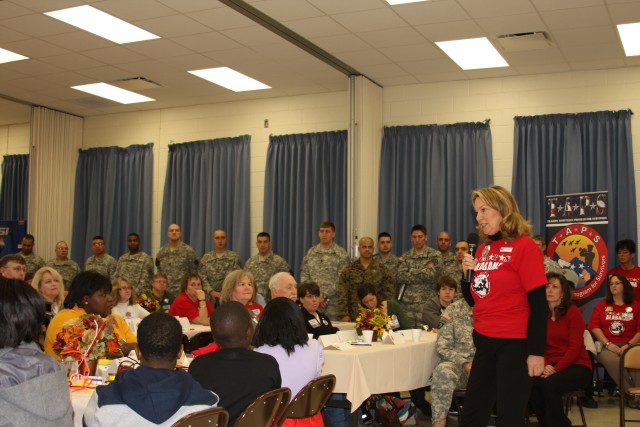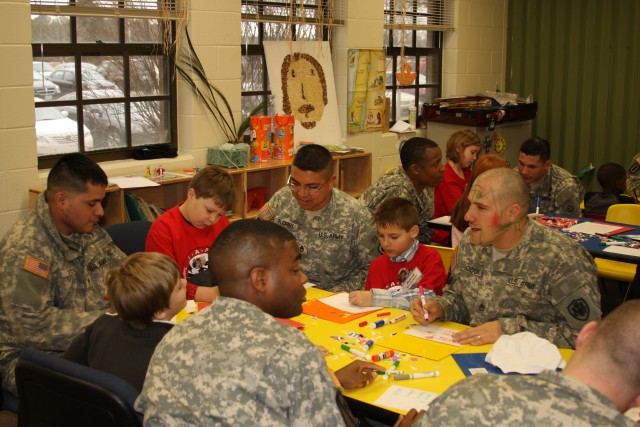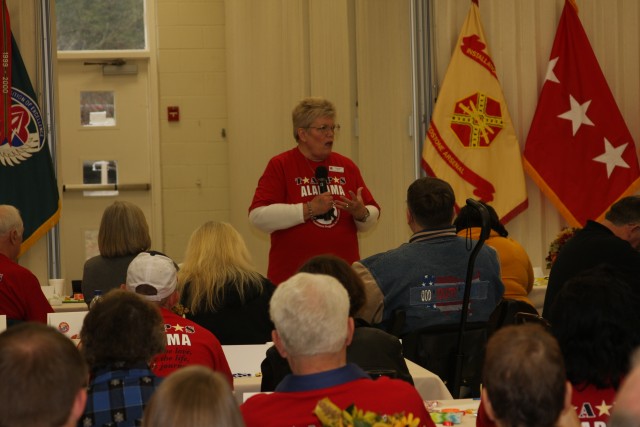HUNTSVILLE, Ala. - Earlier this month, Redstone Arsenal reached out to surviving military Families as the installation hosted its first Tragedy Assistance Program for Survivors seminar.
The TAPS seminar was Feb. 5 at Redstone Arsenal's Bicentennial Chapel, with more than 200 Family members of fallen warriors coming together with those who understand issues they face. TAPS survivor seminars provide an opportunity for survivors to gather and learn information, gain resources as well as personal contact with fellow survivors in a spirit of friendship and understanding.
TAPS is a 24/7 tragedy assistance resource for anyone who has suffered the loss of a loved one serving in the military, regardless of the relationship to the deceased or the circumstance of their death.
"Thank you all for coming," said Maj. Gen. James E. Rogers, commanding general of the U.S. Army Aviation and Missile Command. "This TAPS program is wonderful, it's a great program and it is meant for all for you. This is the first time TAPS has been here, but I'll tell you, it won't be the last time.
"Our goal is to open the doors to you, not only for this program, but for whatever you need. Our mission in life is to take care of you because we truly do care," he added. "We are all family. We stay together, we work together and we'll always be together."
After Rogers spoke, those in attendance got a chance to learn about resources and attend workshops available to them as survivors of fallen service members.
Since its founding in 1994, TAPS has assisted more than 30,000 surviving Family members, casualty officers and caregivers. TAPS provides comfort and care through comprehensive services and programs including peer-based emotional support, case work assistance, crisis intervention, and grief and trauma resources.
"TAPS is unique in that we are a program for all those who are grieving a loss of a loved one, regardless of the geography of their death or the circumstances," said Bonnie Carroll, TAPS founder and president. "Our connection is that our loved ones stepped out above the rest of society in character, in courage, in honor and ability to do something extraordinary. They served selflessly in the cause of freedom and we are so proud of them.
"For those of you who are here for the first time, thank you for having the courage to stick out your hand and trust that there will be someone to step over and take it and walk with you," she added. "And for those who have been here before, thank you for coming back and thank you for making that decision to step over and take a hand and share that journey. This is our family and this is what we can do for each other to honor those we love."
During the seminar, Darcie Sims, grief counselor with TAPS, spent time listening to those who had traveled to Redstone and provide emotional help and healing to those in attendance.
"We came with different stories but we have all come here. Not because someone we love has died, but more importantly, someone we love lived," Sims said. "And they wore the uniform of this country, and no matter how they died, or where they died or when they died, they stepped out amongst all the other people and served their country and they died as heroes, and you sit here today as a hero as well."
As the seminar continued, children and teens were separated into their own conference sessions called "Good Grief Camp," where they got a chance to discuss issues important to them with people in their own age group. The camp provides a safe and supportive atmosphere to conduct activities and opportunities to learn coping skills, establish and identify support systems and create awareness that they are not alone in the grief of their loved one.
"The children are able to open up for the first time because they are around others who have had a military loss. The Soldier volunteers and mentors who are there show them that the military still supports them. It is just incredible," said Heather Campagna, TAPS Youth Programs director. "The dynamics of the groups are all different. Those in attendance feed off of each other and give something back and those who are farther along in their grief seem to always help those who are not. It is really inspiring to see."
During the event's "Good Grief Camp," Soldiers and one Marine stationed at Redstone Arsenal spent time as mentors for the youths who came for the seminar.
"It is important for service members to interact with the community and to be able to give back anything we can, especially to family members of fallen Soldiers," said Sgt. Tiffany Weaver, Redstone Arsenal Noncommissioned Officers Academy. "I am excited to be a part of today. I feel proud to wear this uniform and to help be a part of this organization that gives support to these Families."
On Sunday, some attendees took part in peer mentor training where they learned how to console others who, in the future, may also lose a loved one serving their country. The training was for survivors who are at least 18 months beyond their own loss and ready to offer support for others.
"When you first reach out to TAPS they send you a packet and the first statement in that packet says 'You are not going crazy,'" said Cindy Moyer, mother of Army Sgt. Joshua Briggs who was a member of the 160th Special Operations Aviation Regiment. "TAPS gives you a chance to say you don't ever have to get over this. Everybody has their own story and it is a journey you have to go through, but we don't have to get over it. It is a great support system that allows you to go through in your own time and not at what other people expect.
"For people who are coming for the first time it is a chance to share with people who are able to understand what you are feeling," she added. "TAPS is awesome and the people here know what they are doing and the people working here are a gift."








Social Sharing